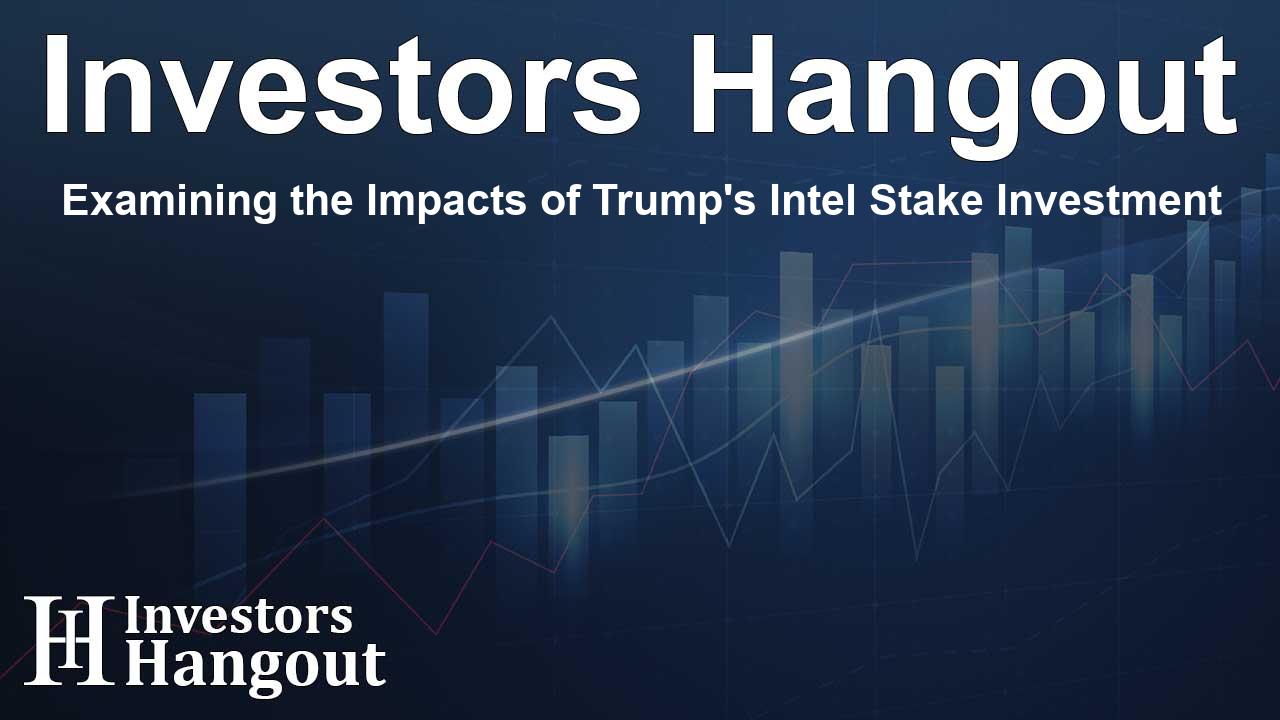Examining the Impacts of Trump's Intel Stake Investment

Understanding Trump's Investment in Intel
Recently, President Donald Trump's noteworthy $11 billion investment in Intel Corporation (NASDAQ: INTC) has sparked significant discussions among analysts and stakeholders. This strategic move represents a substantial vote of confidence in the chipmaker's potential for growth, particularly as the tech industry continues to evolve at a rapid pace.
Kuo's Analysis: Valuation and Future Prospects
Respected analyst Ming-Chi Kuo from TF Securities emphasizes that while this investment from the U.S. government is a positive sign for Intel, it does not guarantee immediate advancements in the company's semiconductor technology. Kuo explained that the investment, part of a larger $8.9 billion allocation in Intel common shares, indicates that Intel is a company considered "too big to fail".
Investment Implications for Intel
The recent purchase of over 433 million shares at approximately $20.47 each grants the government a noteworthy 9.9% stake in the company. Kuo argues that this move effectively raises the company's valuation floor. By assuring investors of some stability, it may alleviate fears related to fluctuating market conditions and restore confidence in Intel's future growth.
Avoiding Political Interference
The equity structure of this investment is crafted to prevent political influence over the company's operations. The U.S. government has waived typical shareholder rights, allowing Intel to maintain autonomy over its governance and future strategies. As a result, all proceeds from this primary stock issuance will directly fund Intel's operational and manufacturing capabilities, positioning the company for future success rather than acting as a temporary bailout.
Long-Term Goals Over Immediate Control
Kuo reiterates that the choice of common stock over preferred stock signifies a long-term strategic commitment to Intel, avoiding fixed dividend obligations. This perspective reinforces the notion that the investment is not merely a reaction to short-term issues but a foundational step support Intel's journey in the semiconductor landscape.
Challenges Ahead for Intel
Despite this optimistic scenario, Intel faces significant hurdles. The company has recently reported challenges including substantial losses in its foundry operations and delays regarding the opening of its new facility. In light of these issues, Kuo highlights that although the investment is a strategic advantage, it does not eliminate existing operational struggles.
Comparative Analysis: TSMC and Samsung
Moreover, Kuo has pointed out that this investment strategy is unlikely to extend to competitors such as Taiwan Semiconductor Manufacturing Co. (NYSE: TSM) or Samsung Electronics (OTC: SSNLF). The national security implications of foreign governments stakeholding in these companies could pose potential political risks that the U.S. must consider.
Market Reaction and Future Insights
In the financial markets, Intel's stock saw a rise of 1.05% in after-hours trading following the announcement of this investment. The current momentum, as indicated by various performance rankings, suggests that the company holds promise in both short and long-term scenarios, despite stiff competition from firms like Advanced Micro Devices Inc. (NASDAQ: AMD) and Arm Holdings (NASDAQ: ARM).
As the landscape of semiconductor manufacturing continues to shift, the insights from industry leaders and analysts like Kuo will be critical for understanding Intel's trajectory in the coming years.
Frequently Asked Questions
What is the significance of Trump's $11 billion investment in Intel?
The investment aims to boost investor confidence in Intel and improve its operational funding for future growth without immediate political interference.
How does this investment affect Intel's stock valuation?
Analysts believe it raises the valuation floor for Intel, potentially providing stability in uncertain markets.
What challenges are facing Intel despite this investment?
Intel faces hurdles including operational losses, leadership issues, and delays in its manufacturing initiatives.
Why is this investment model not applicable to TSMC and Samsung?
The investment model presents national security concerns that could complicate foreign government stakes in those firms.
What is the market reaction to Intel's recent developments?
Following the investment announcement, Intel's shares experienced a rise, suggesting investor optimism about its future prospects.
About The Author
Contact Olivia Taylor privately here. Or send an email with ATTN: Olivia Taylor as the subject to contact@investorshangout.com.
About Investors Hangout
Investors Hangout is a leading online stock forum for financial discussion and learning, offering a wide range of free tools and resources. It draws in traders of all levels, who exchange market knowledge, investigate trading tactics, and keep an eye on industry developments in real time. Featuring financial articles, stock message boards, quotes, charts, company profiles, and live news updates. Through cooperative learning and a wealth of informational resources, it helps users from novices creating their first portfolios to experts honing their techniques. Join Investors Hangout today: https://investorshangout.com/
The content of this article is based on factual, publicly available information and does not represent legal, financial, or investment advice. Investors Hangout does not offer financial advice, and the author is not a licensed financial advisor. Consult a qualified advisor before making any financial or investment decisions based on this article. This article should not be considered advice to purchase, sell, or hold any securities or other investments. If any of the material provided here is inaccurate, please contact us for corrections.
